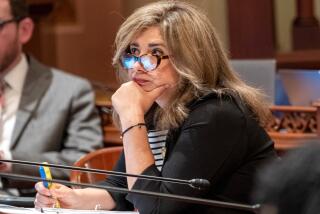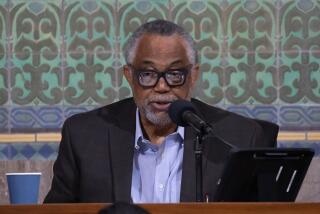Kisses Were Just Friendly Gestures, Conroy Testifies
- Share via
SACRAMENTO — Former Assemblyman Mickey Conroy admitted Thursday to sometimes hugging and kissing on the cheek a onetime employee who is suing him for sexual harassment, but said he stopped after she complained, and ordered other staffers to clean up their behavior.
Conroy, testifying for the first time in his civil trial, said that former legislative assistant Robyn Boyd appeared to be a willing participant in what he considered friendly gestures.
Boyd has sued Conroy, his former chief of staff, Pete Conaty, and the state Assembly, alleging that as a $6-an-hour assistant in 1993 she was subjected to hugs, kisses, inappropriate touching and sexual jokes, then was ostracized and ultimately fired for complaining. Conroy, 69, and Conaty deny that they sexually harassed her.
Conroy left office in November because of term limits and was trounced that same month in a bid for an Orange County Board of Supervisors seat after his opponent repeatedly brought up the harassment case.
While not disputing that he kissed and hugged his accuser on occasion, the silver-haired Republican from Orange County put a decidedly different spin on his behavior.
“I never kissed Robyn Boyd anywhere other than the cheek,” Conroy said, suggesting that at most they had hugged or kissed “once or twice.”
He described one encounter with Boyd during an after-hours political function, where he pursed his lips and joked to a bystander that she was a perk of the office, as “kind of a mutual thing” because Boyd “was stretching out her arms as I was.”
Conroy acknowledged that he did not realize that Boyd, 37, would consider the encounter embarrassing and admitted that it wasn’t very compassionate to publicly call her a perk.
While conceding that he felt some remorse, Conroy vigorously sought to explain his actions.
He said it was entirely appropriate for Conaty as chief of staff to order legislative subordinates to regularly serve coffee or water and accompany him to political events after work hours.
The former Marine Corps aviator agreed under questioning that Boyd and another woman on his staff would occasionally walk arm in arm with him to receptions and that he called them his “bookends.”
And he said that he occasionally would drive Boyd to her car and give her a good-night hug and kiss, calling it “the normal, proper good night, take care, drive carefully kind of thing.”
Conroy also conceded that he had offered his coat to Boyd repeatedly during an outdoor memorial service for an assemblyman who had died. When she didn’t take it, Conroy said, he held up his coat to block the wind and “she moved into me” and he put his arm on her shoulder “since the service was so long.”
He suggested that Boyd did not understand an ongoing joke that he had with a woman staffer who once worked at a popular hotel in town. Conroy would ask whether the woman should get “one room or two,” but he said it was always pointed in a lighthearted way at the other woman, not Boyd.
Conroy said Boyd would on occasion volunteer to give him a neck rub because of pain he suffered as a result of an injury years ago.
The three-term lawmaker insisted that he took pains even before Boyd complained to ensure that the office environment wasn’t out of line.
Conroy said he never saw a “Sexual Harassment Consent Form” that was distributed in the office by a staffer as a joke.
And Conroy also testified that he told a woman aide that a sign she put up by her desk--it read “Sexual harassment in this area will not be reported; however, it will be graded”--would have to come down if anyone had a problem with it. He said Boyd never griped about the sign.
“I took the proper action,” he said. “I didn’t think the sign was sexual harassment.”
But he later suggested that the Assembly’s “zero tolerance policy” on sexual harassment seemed a bit extreme. “Just saying good morning to someone who takes it the wrong way would be a violation of the zero policy,” Conroy said.
More to Read
Sign up for Essential California
The most important California stories and recommendations in your inbox every morning.
You may occasionally receive promotional content from the Los Angeles Times.










